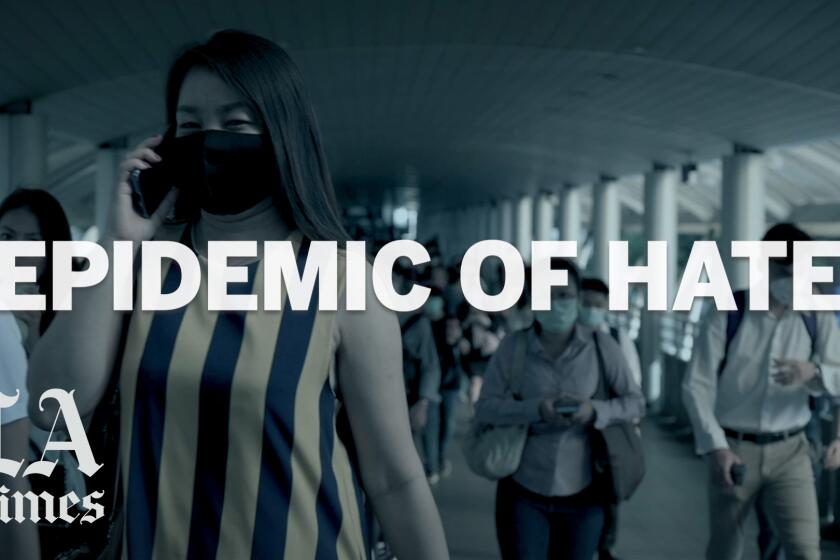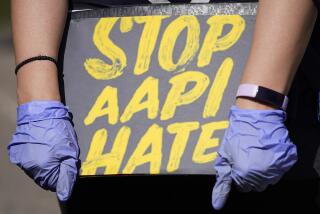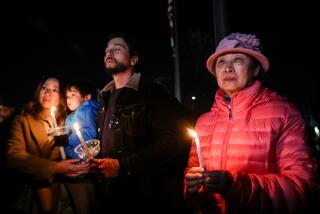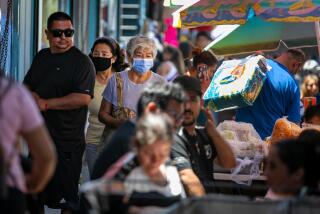Officials decry anti-Asian bigotry, misinformation amid coronavirus outbreak

- Share via
As the coronavirus has spread across the United States, officials are trying to push back against Asian American bias and misinformation surrounding the outbreak.
There are already signs that some are staying away from Chinatowns and other Asian communities in the U.S., sparking concern about bias.
Sen. Dianne Feinstein (D-San Francisco) issued a statement this week urging residents not to spread false information or give in to fears.
“We’ve also seen a rise in racism toward Asian Americans because the virus is associated with China,” she said. “This is unconscionable and it’s not the American way. People of all ages, races and ethnicities are susceptible to this disease. Bigotry toward any one group for a virus they have nothing to do with makes no sense.”
Viruses often spark panic. But the coronavirus has spread something else besides misinformation and false rumors: xenophobia and anti-China sentiment.
In San Francisco, merchants, residents and leaders held a march Sunday through the city’s historic Chinatown to denounce racism and bias fueled by COVID-19. They carried banners that read, “Fight the Virus — Not the People!”
Merchants say San Francisco’s Chinatown has been hit hard by the virus, with customers disappearing.
“Standing in solidarity with our Chinese American community & against racism & xenophobia. Coronavirus is a serious public health threat. It’s not an invitation to racial stereotyping,” wrote state Sen. Scott Wiener (D-San Francisco), who attended the event.
“We are here to fight two viruses. Coronavirus. But we are also here to fight bigotry,” Vincent Pan, the co-executive director of Chinese for Affirmative Action, told KGO-TV. “Part of the root cause is misunderstanding, which leads to fear, which leads to hate.”
Last week, San Francisco public health officials sent out a coronavirus alert that noted “at this time, there are no recommendations to cancel social gatherings or avoid restaurants. However, if you are sick, you should stay home and not attend.”
Merchants have said Los Angeles’ Chinatown has seen a big drop in visitors. Street parking and restaurant seating were readily available in the historic neighborhood known for its colorful pagoda-style buildings, art galleries and plazas strewn with bright red lanterns and neon-lined rooftops.
Social media has fed virus panic. But the world has become more interwoven. It should be harder to fear the Chinese when Chinese Americans are friends, family.
Chinatown merchants remain perplexed that people are staying away, as there has yet to be a single documented case of the novel coronavirus connected to either L.A. or San Francisco’s historic districts.
“We’ve had a drop in business the last couple of months like a lot of other places in Chinatown,” restaurant owner Benny Yun, 38, told The Times last week. “It could be worse. I’ve heard of about five restaurants in the San Gabriel Valley that have closed in the last month.”
Meanwhile, coronavirus cases are continuing to spread across the state. At least five Northern California counties reported new cases of COVID-19 on Monday, bringing the total in California to nearly 50. Sonoma County joined several other areas in the state in declaring a local emergency in response to the outbreak.
More to Read
Sign up for Essential California
The most important California stories and recommendations in your inbox every morning.
You may occasionally receive promotional content from the Los Angeles Times.














